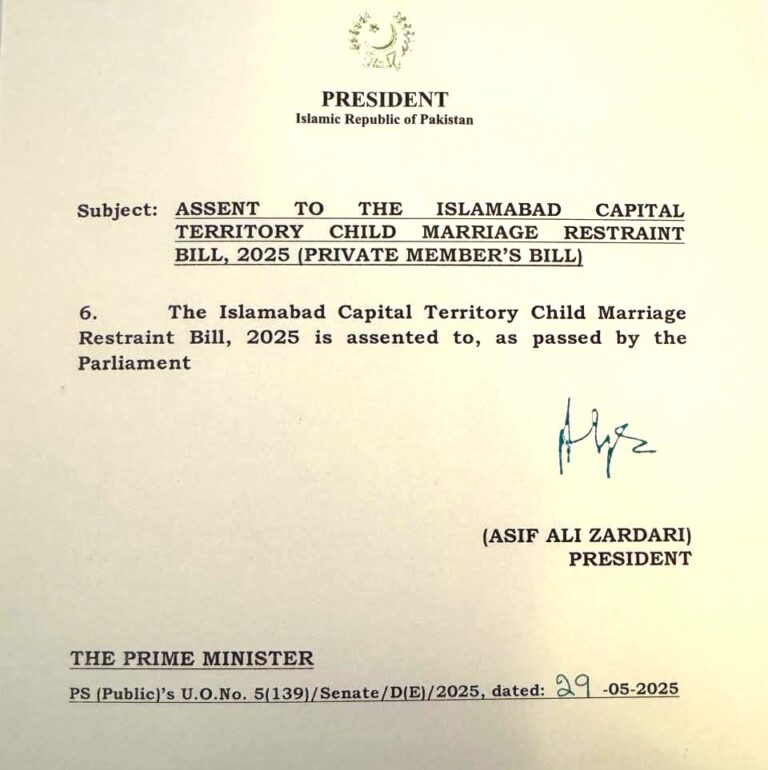Despite intense opposition from Pakistani Muslim groups, President Asif Ali Zardari signed the law on Friday (May 30) a landmark bill to curb child marriages, setting the minimum age for marriages for both genders at the age of 18 in the Islamabad Capital Territory (ICT).
“In 2025, the Child Marriage Confinement Bill of Islamabad Capital Territories agrees to the notice signed by Zardari Read, as passed by the Congress.
Opponents include the Islamic Ideology Council (CII) and declared that classifying marriages under the age of 18 as rape is not in accordance with Sharia (Islamic law).
The bill defines a child as any person of gender under the age of 18, and states that if any of the individuals are under the age of 18, the Nika (Islamic marriage) registrar (facilitator) is not permitted to strictly sole the marriage.
According to the law, if the registrar violates this law, they can face a prison for up to one year and a fine of 100,000 Pakistani Rupees (USD 355). The bill says men over the age of 18 who marry a minor girl could face tough imprisonment for up to three years.
“Living with a child under the age of 18 in a marital relationship is considered statutory rape,” the bill states.
Senator Shelly Lehman, Pakistan People’s Party (PPP), has called for the bill as a groundbreaking victory in the fight against child marriage.
“This law is the result of a long and difficult struggle and will help improve the education and health of young girls,” Lehman said in a post on X (formerly Twitter).
She praised Zardari for signing the bill despite pressure from the Islamic forces.
“The signing of the Child Marriage Bill is a symbol of a new era of reform in Pakistan,” she said. “This bill is not just a law, it’s a commitment that our girls have the right to a life of education, health and prosperity.”
She called on other states to take steps towards such laws.
Maulana Jalaludin of Jamiat Ulema-e-Islam-Fazl (Jui-F), a member of the right-wing Islamic party, had warned Zardari about signing the bill at a previous press conference.
“The Congress is not on the Quran and Sunnah,” Jalardin said. “This bill is not only against Sharia’s norms, but against the values and traditions of our society.”
He called it the legislative part of the Western conspiracy to destroy Pakistan’s “family system.” The “bad intentions” were evident because the bill was not transferred to the CII, but was approved by Congress “intended” and approved.
The Pakistan Human Rights Commission (HRCP) said it criticized the CII for opposing important laws. He said the bill follows Pakistan’s constitutional guarantees and international human rights commitments.
“Because it is not compatible with religion, it not only undermines child protection the rights of all children, but also reflects a deeply biased interpretation of Islamic principles,” the HRCP said.
In its advice response, the CII argued that Islamic jurisprudence allows girls to marry once they reach adolescence, regardless of age. He said that setting a fixed minimum age of 18 for marriage should not be legally binding because certain religious interpretations are contradictory.
The HRCP was countered by arguing that the state must legislate in the best interests of its children, to prevent early marriages, particularly related to serious health risks, refusal to education and systematic gender inequality. Rights groups have urged the government to resist pressure to dilute the bill and ensure its full and immediate implementation.
“The nation must not surrender to a regressive position that puts children’s lives and futures at risk,” the body said.
Christian rights activists praised Zardari for agreeing to the law, calling it a fork in the struggle to protect minor girl girls from forced conversion of faith to adductors and marriage.
“This groundbreaking law is limited to the territory of the capital of Islamabad, but it will help Christian girls pave the way for the passage of similar laws in Punjab, the main target of forced conversion and marriage.”
Rakha, who successfully defended several Christians who were falsely accused of blasphemy and rescued a Christian girl from a Muslim temptation, said that approval of Zardari’s bill was “a hope of hope for Christians in Punjab.”
“The Child Marriage Bill was introduced last year in Punjab Parliament and we are very excited that the CII review will now be presented for votes,” he told Christian Daily International Morning Star News. “Suppressing the legal age of marriage to 18 years for both genders would prevent the perpetrator from mistakenly converting a minor Christian girl to legally represent a sex crime.”
With approval of the Punjab bill pending, the minimum age for girls to marry is only 16 in the state. Nationally, the Christian Marriage (Amendment) Act 2024 set the age of marriage to 18 for Christians only. If they convert to Islam, the girl thinks Muslims will come under Sharia, so they allow them to marry young.
Usually, a tempted girl in Pakistan is accused of young people as young as 10 years old, converted to Islam, raped under a hidden gem of Islamic “marriage” and pressured to record false statements in favour of the temptator, rights advocates say. The judge routinely ignores documentary evidence related to the age of a child and returns the temptation to the temptation as a “legal wife.”
Pakistan, a Muslim with a population of 96%, ranked 8th on the 2025 World Watchlist, the hardest place to become a Christian.
